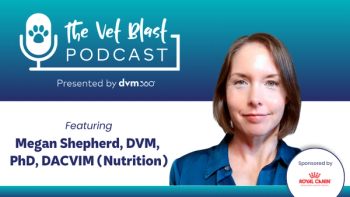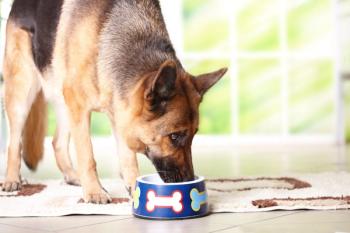
Iams Nutrition Insider for the Veterinary Team: The latest insights on inflammatory bowel disease (Sponsored by Iams)
Inflammatory bowel disease (IBD) has been an important topic of discussion and research in canine and feline gastroenterology for more than 20 years.
Inflammatory bowel disease (IBD) has been an important topic of discussion and research in canine and feline gastroenterology for more than 20 years. At times, IBD has been stated to be the most common cause of chronic gastrointestinal signs in dogs and cats.
There has not been a clear consensus as to exactly what constitutes canine and feline IBD. Most researchers and clinicians define IBD as a chronic condition causing persistent or recurrent gastrointestinal signs with histologic evidence of inflammatory infiltration of the small or large intestinal mucosa of unknown cause. Current thought is that the condition can only be called IBD if no underlying cause for the inflammation can be found.1
The role of gut bacteria
There are published accounts of antibiotics (e.g. tylosin) curing IBD dating back 30 years.2 Since then, the efficacy of tylosin has been confirmed in other studies,3 which has helped reveal the potential role that bacteria play in causing or maintaining the intestinal inflammation in patients with IBD.1,4-7 Recently, the term dysbiosis has been suggested as a better description of what is occurring in the intestines of patients with IBD.
Dysbiosis refers to an imbalance in the commensal intestinal bacterial population such that bacterial species that tend to favor inflammation in the intestinal mucosa (e.g. Escherichia coli) are overrepresented, while those species that are less likely to induce inflammation (e.g. Bifidobacterium species) are underrepresented. The result is initiation and/or perpetuation of intestinal inflammation.
Antibiotics and prebiotics
While antibiotics have been effective in treating untold numbers of dogs and cats with chronic gastrointestinal disease, there is growing concern over the development of antibiotic resistance associated with long-term use of antibiotics in animals. Therefore, it is reasonable to explore other methods of altering or modulating intestinal bacterial ecosystems or their effect upon the intestinal tract. Prebiotics and probiotics are two possibilities that bear investigation.
Prebiotics are dietary fibers (e.g. fructooligosaccharides or xylooligosaccharides) that cannot be metabolized by mammals but that preferentially feed some bacterial species (i.e. "good" bacteria that benefit the patient), theoretically giving these species a competitive advantage over less desirable bacteria that may harm a patient.
In one study, prebiotics were beneficial in treating dogs with suspected small intestinal bacterial overgrowth, or SIBO (see the Related Link "Prebiotics Research").8 One report is certainly not proof of efficacy, so additional studies confirming this study's findings are needed before sweeping statements can be made. Nonetheless, studies such as this one are reasonable justification to continue looking at the modulation of intestinal bacteria populations with carefully designed clinical trials using prebiotics or probiotics.
Educating clients about IBD
Michael Willard, DVM, MS, DACVIM
Department of Small Animal Clinical Sciences
College of Veterinary Medicine
Texas A&M University
References
1. Washabau RJ, Day MJ, et al. Endoscopic, biopsy, and histopathologic guidelines for the evaluation of gastrointestinal inflammation in companion animals. The WSAVA International Gastrointestinal Standardization Group, 2009 ACVIM Consensus Statement. J Vet Intern Med 2010;24(l): 10-26.
2. van Kruiningen H. Clinical efficacy of tylosin in canine inflammatory bowel disease. J Am Arum HospAssoc 1976;12:498-501.
3. Westennarck E, Skrzypczak T, et al. Tylosin-responsive chronic diarrhea in dogs. J Vet Intern Med 2005;19:177-186.
4. Simpson KW. Host floral interactions in the gastrointestinal tract. ACVIM Forum, Montreal, Canada 2009:437-439.
5. Xenoulis PG, Palculict B, et al. Molecular-phylogenetic characterization of microbial communities imbalances in the small intestine of dogs with inflammatory bowel disease. FEMS Microbiol Ecol 2008;66:579-589.
6. Janeczko S, Atwater D, et al. The relationship of mucosal bacteria to duodenal histopathology, cytokine mRNA, and clinical disease activity in cats with inflammatory bowel disease. Vet Microbiol 2008;128:178-193.
7. Craven M, McDonough DS, Simpson KW. High throughput pyrosequencing reveals reduced bacterial diversity in the duodenal mucosa of dogs with IBD. J Vet Intern Med 2009;23:731 [abstract].
8. Ruaux CG, Tetrick MA, Steiner JM, et al. Fecal consistency and volume in dogs with suspected small intestinal bacterial overgrowth receiving broad spectrum antibiotic therapy or dietary fructo-oligosaccharide supplementation. J Vet Intern Med 2004;18:425 [abstract].
Newsletter
From exam room tips to practice management insights, get trusted veterinary news delivered straight to your inbox—subscribe to dvm360.




